Economics Assignment: Economic Models, Assumptions, and Choices
VerifiedAdded on 2023/06/07
|7
|1484
|185
Homework Assignment
AI Summary
This economics assignment explores the basic assumptions economists use when building models, as presented in an article discussing a hypothetical hangover cure. The assignment analyzes the importance of these assumptions in simplifying complex real-world scenarios, such as international trade, and their role in understanding economic behavior and decision-making. It examines how rational people choose between alternatives, the concept of opportunity cost, and the reasons why real-world behavior often deviates from the rational model. The assignment also discusses how economists explain changes in choices, using examples from the article, and evaluates whether the article's arguments are more theoretical than practical. The student explores the core concepts of rational choice theory and the implications of deviations from it in everyday life.
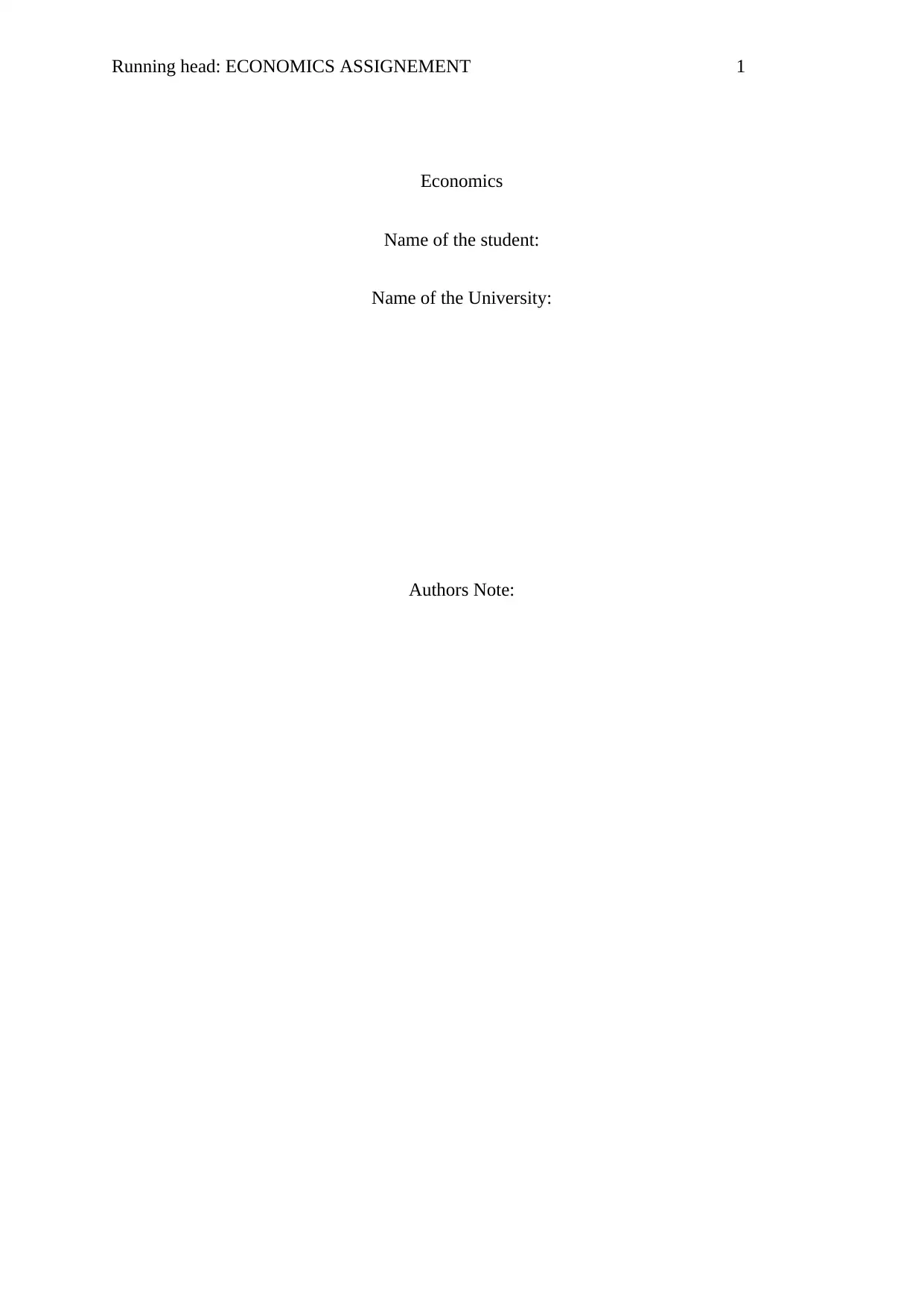
Running head: ECONOMICS ASSIGNEMENT 1
Economics
Name of the student:
Name of the University:
Authors Note:
Economics
Name of the student:
Name of the University:
Authors Note:
Paraphrase This Document
Need a fresh take? Get an instant paraphrase of this document with our AI Paraphraser
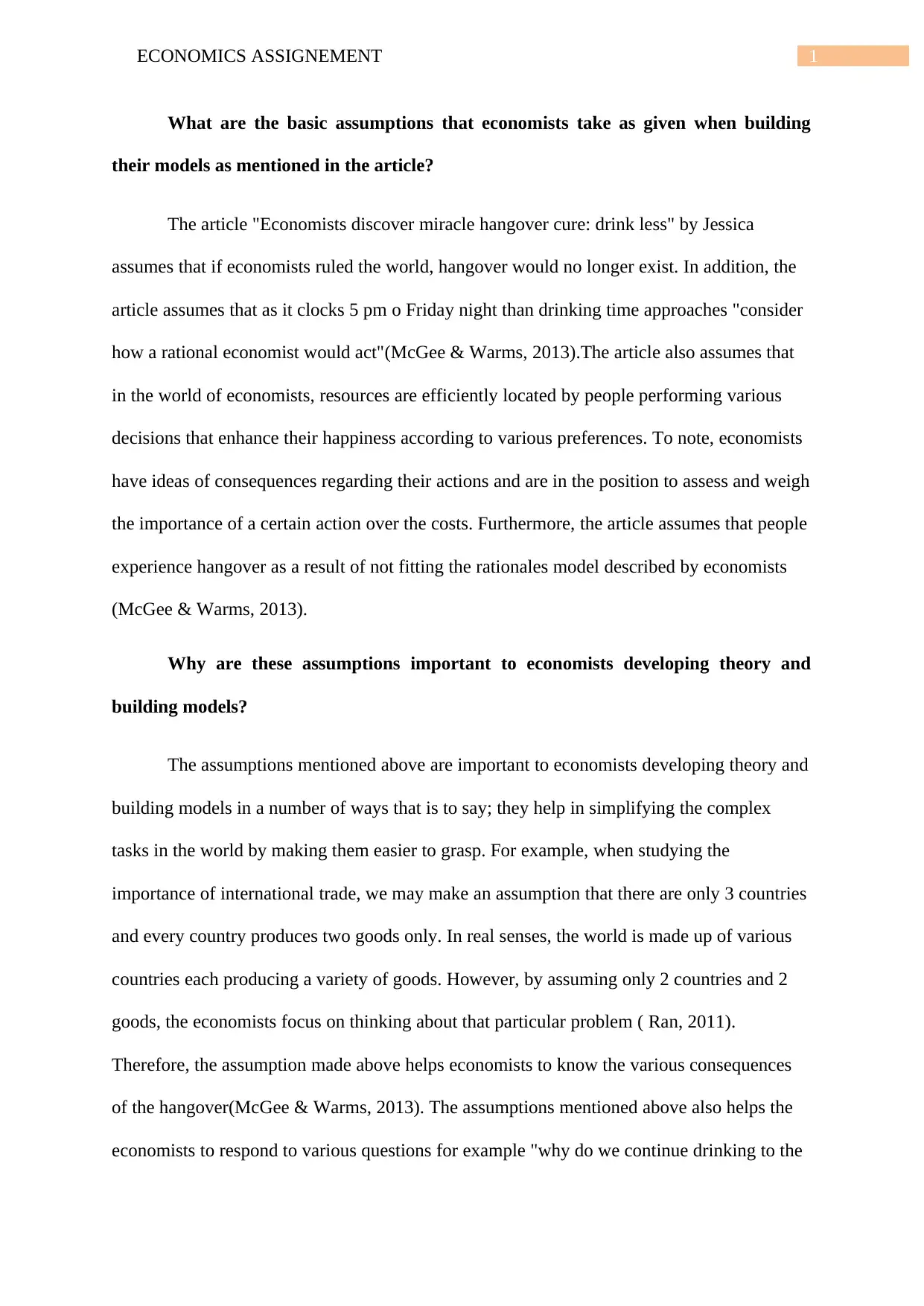
1ECONOMICS ASSIGNEMENT
What are the basic assumptions that economists take as given when building
their models as mentioned in the article?
The article "Economists discover miracle hangover cure: drink less" by Jessica
assumes that if economists ruled the world, hangover would no longer exist. In addition, the
article assumes that as it clocks 5 pm o Friday night than drinking time approaches "consider
how a rational economist would act"(McGee & Warms, 2013).The article also assumes that
in the world of economists, resources are efficiently located by people performing various
decisions that enhance their happiness according to various preferences. To note, economists
have ideas of consequences regarding their actions and are in the position to assess and weigh
the importance of a certain action over the costs. Furthermore, the article assumes that people
experience hangover as a result of not fitting the rationales model described by economists
(McGee & Warms, 2013).
Why are these assumptions important to economists developing theory and
building models?
The assumptions mentioned above are important to economists developing theory and
building models in a number of ways that is to say; they help in simplifying the complex
tasks in the world by making them easier to grasp. For example, when studying the
importance of international trade, we may make an assumption that there are only 3 countries
and every country produces two goods only. In real senses, the world is made up of various
countries each producing a variety of goods. However, by assuming only 2 countries and 2
goods, the economists focus on thinking about that particular problem ( Ran, 2011).
Therefore, the assumption made above helps economists to know the various consequences
of the hangover(McGee & Warms, 2013). The assumptions mentioned above also helps the
economists to respond to various questions for example "why do we continue drinking to the
What are the basic assumptions that economists take as given when building
their models as mentioned in the article?
The article "Economists discover miracle hangover cure: drink less" by Jessica
assumes that if economists ruled the world, hangover would no longer exist. In addition, the
article assumes that as it clocks 5 pm o Friday night than drinking time approaches "consider
how a rational economist would act"(McGee & Warms, 2013).The article also assumes that
in the world of economists, resources are efficiently located by people performing various
decisions that enhance their happiness according to various preferences. To note, economists
have ideas of consequences regarding their actions and are in the position to assess and weigh
the importance of a certain action over the costs. Furthermore, the article assumes that people
experience hangover as a result of not fitting the rationales model described by economists
(McGee & Warms, 2013).
Why are these assumptions important to economists developing theory and
building models?
The assumptions mentioned above are important to economists developing theory and
building models in a number of ways that is to say; they help in simplifying the complex
tasks in the world by making them easier to grasp. For example, when studying the
importance of international trade, we may make an assumption that there are only 3 countries
and every country produces two goods only. In real senses, the world is made up of various
countries each producing a variety of goods. However, by assuming only 2 countries and 2
goods, the economists focus on thinking about that particular problem ( Ran, 2011).
Therefore, the assumption made above helps economists to know the various consequences
of the hangover(McGee & Warms, 2013). The assumptions mentioned above also helps the
economists to respond to various questions for example "why do we continue drinking to the
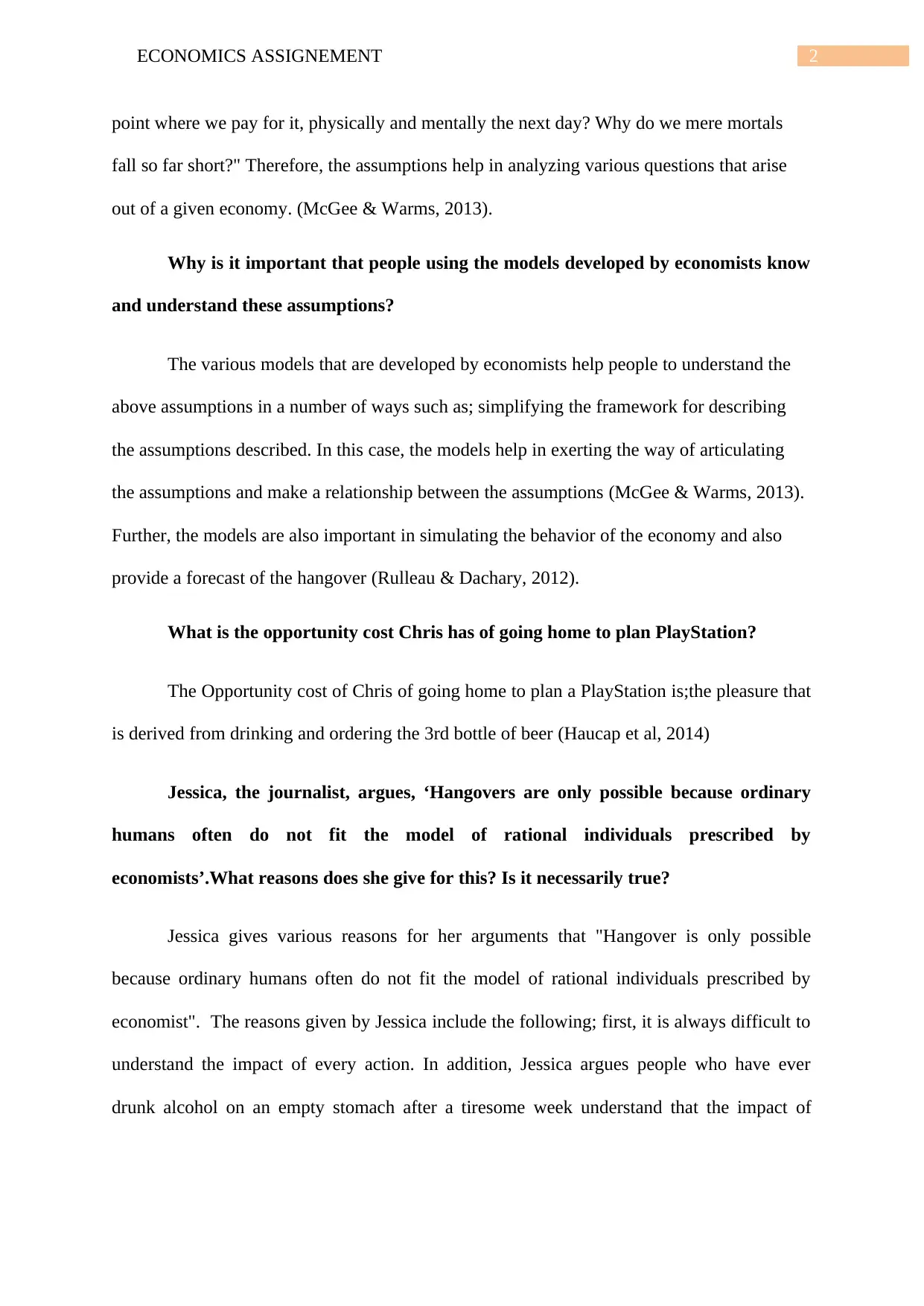
2ECONOMICS ASSIGNEMENT
point where we pay for it, physically and mentally the next day? Why do we mere mortals
fall so far short?" Therefore, the assumptions help in analyzing various questions that arise
out of a given economy. (McGee & Warms, 2013).
Why is it important that people using the models developed by economists know
and understand these assumptions?
The various models that are developed by economists help people to understand the
above assumptions in a number of ways such as; simplifying the framework for describing
the assumptions described. In this case, the models help in exerting the way of articulating
the assumptions and make a relationship between the assumptions (McGee & Warms, 2013).
Further, the models are also important in simulating the behavior of the economy and also
provide a forecast of the hangover (Rulleau & Dachary, 2012).
What is the opportunity cost Chris has of going home to plan PlayStation?
The Opportunity cost of Chris of going home to plan a PlayStation is;the pleasure that
is derived from drinking and ordering the 3rd bottle of beer (Haucap et al, 2014)
Jessica, the journalist, argues, ‘Hangovers are only possible because ordinary
humans often do not fit the model of rational individuals prescribed by
economists’.What reasons does she give for this? Is it necessarily true?
Jessica gives various reasons for her arguments that "Hangover is only possible
because ordinary humans often do not fit the model of rational individuals prescribed by
economist". The reasons given by Jessica include the following; first, it is always difficult to
understand the impact of every action. In addition, Jessica argues people who have ever
drunk alcohol on an empty stomach after a tiresome week understand that the impact of
point where we pay for it, physically and mentally the next day? Why do we mere mortals
fall so far short?" Therefore, the assumptions help in analyzing various questions that arise
out of a given economy. (McGee & Warms, 2013).
Why is it important that people using the models developed by economists know
and understand these assumptions?
The various models that are developed by economists help people to understand the
above assumptions in a number of ways such as; simplifying the framework for describing
the assumptions described. In this case, the models help in exerting the way of articulating
the assumptions and make a relationship between the assumptions (McGee & Warms, 2013).
Further, the models are also important in simulating the behavior of the economy and also
provide a forecast of the hangover (Rulleau & Dachary, 2012).
What is the opportunity cost Chris has of going home to plan PlayStation?
The Opportunity cost of Chris of going home to plan a PlayStation is;the pleasure that
is derived from drinking and ordering the 3rd bottle of beer (Haucap et al, 2014)
Jessica, the journalist, argues, ‘Hangovers are only possible because ordinary
humans often do not fit the model of rational individuals prescribed by
economists’.What reasons does she give for this? Is it necessarily true?
Jessica gives various reasons for her arguments that "Hangover is only possible
because ordinary humans often do not fit the model of rational individuals prescribed by
economist". The reasons given by Jessica include the following; first, it is always difficult to
understand the impact of every action. In addition, Jessica argues people who have ever
drunk alcohol on an empty stomach after a tiresome week understand that the impact of
⊘ This is a preview!⊘
Do you want full access?
Subscribe today to unlock all pages.

Trusted by 1+ million students worldwide
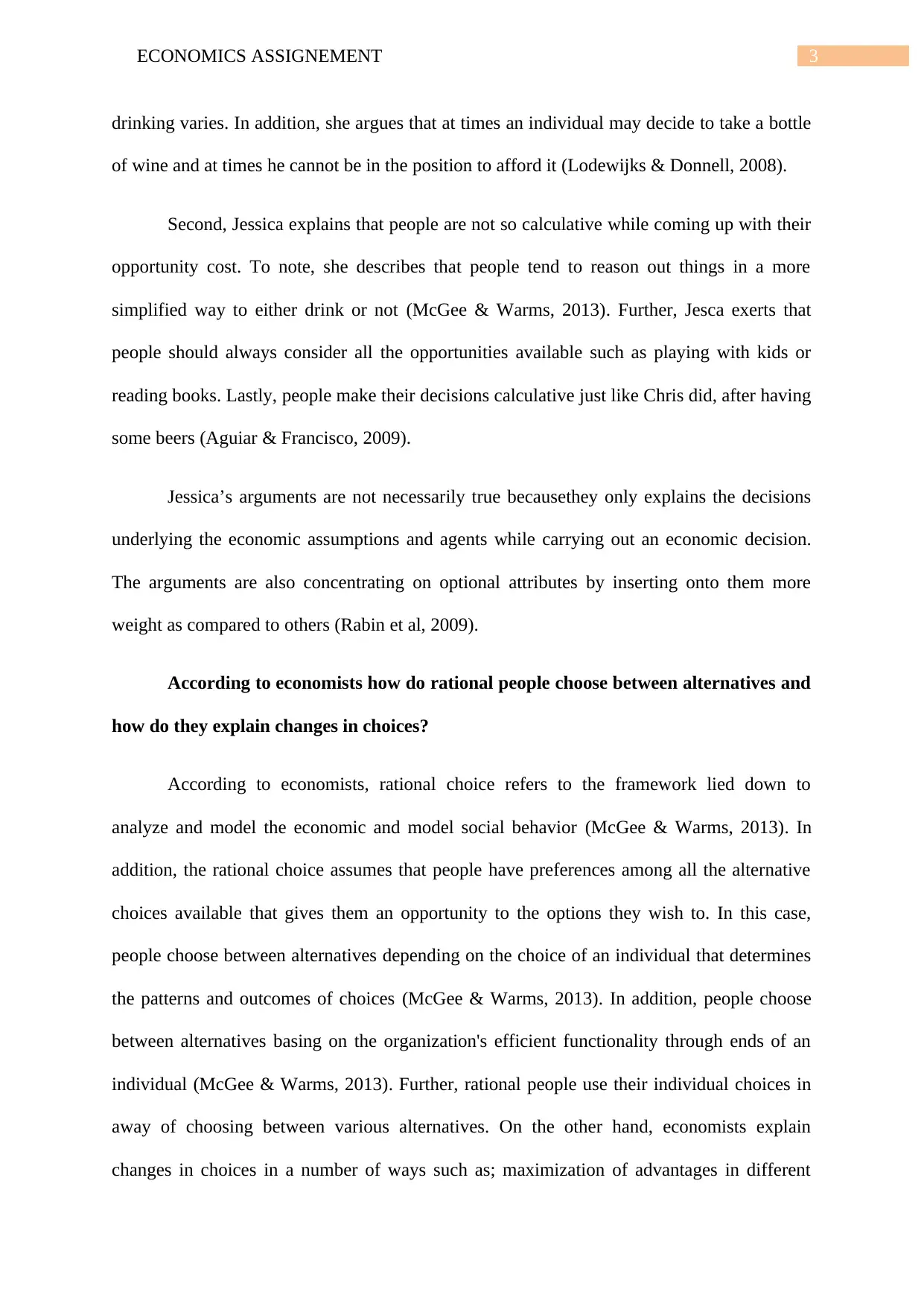
3ECONOMICS ASSIGNEMENT
drinking varies. In addition, she argues that at times an individual may decide to take a bottle
of wine and at times he cannot be in the position to afford it (Lodewijks & Donnell, 2008).
Second, Jessica explains that people are not so calculative while coming up with their
opportunity cost. To note, she describes that people tend to reason out things in a more
simplified way to either drink or not (McGee & Warms, 2013). Further, Jesca exerts that
people should always consider all the opportunities available such as playing with kids or
reading books. Lastly, people make their decisions calculative just like Chris did, after having
some beers (Aguiar & Francisco, 2009).
Jessica’s arguments are not necessarily true becausethey only explains the decisions
underlying the economic assumptions and agents while carrying out an economic decision.
The arguments are also concentrating on optional attributes by inserting onto them more
weight as compared to others (Rabin et al, 2009).
According to economists how do rational people choose between alternatives and
how do they explain changes in choices?
According to economists, rational choice refers to the framework lied down to
analyze and model the economic and model social behavior (McGee & Warms, 2013). In
addition, the rational choice assumes that people have preferences among all the alternative
choices available that gives them an opportunity to the options they wish to. In this case,
people choose between alternatives depending on the choice of an individual that determines
the patterns and outcomes of choices (McGee & Warms, 2013). In addition, people choose
between alternatives basing on the organization's efficient functionality through ends of an
individual (McGee & Warms, 2013). Further, rational people use their individual choices in
away of choosing between various alternatives. On the other hand, economists explain
changes in choices in a number of ways such as; maximization of advantages in different
drinking varies. In addition, she argues that at times an individual may decide to take a bottle
of wine and at times he cannot be in the position to afford it (Lodewijks & Donnell, 2008).
Second, Jessica explains that people are not so calculative while coming up with their
opportunity cost. To note, she describes that people tend to reason out things in a more
simplified way to either drink or not (McGee & Warms, 2013). Further, Jesca exerts that
people should always consider all the opportunities available such as playing with kids or
reading books. Lastly, people make their decisions calculative just like Chris did, after having
some beers (Aguiar & Francisco, 2009).
Jessica’s arguments are not necessarily true becausethey only explains the decisions
underlying the economic assumptions and agents while carrying out an economic decision.
The arguments are also concentrating on optional attributes by inserting onto them more
weight as compared to others (Rabin et al, 2009).
According to economists how do rational people choose between alternatives and
how do they explain changes in choices?
According to economists, rational choice refers to the framework lied down to
analyze and model the economic and model social behavior (McGee & Warms, 2013). In
addition, the rational choice assumes that people have preferences among all the alternative
choices available that gives them an opportunity to the options they wish to. In this case,
people choose between alternatives depending on the choice of an individual that determines
the patterns and outcomes of choices (McGee & Warms, 2013). In addition, people choose
between alternatives basing on the organization's efficient functionality through ends of an
individual (McGee & Warms, 2013). Further, rational people use their individual choices in
away of choosing between various alternatives. On the other hand, economists explain
changes in choices in a number of ways such as; maximization of advantages in different
Paraphrase This Document
Need a fresh take? Get an instant paraphrase of this document with our AI Paraphraser
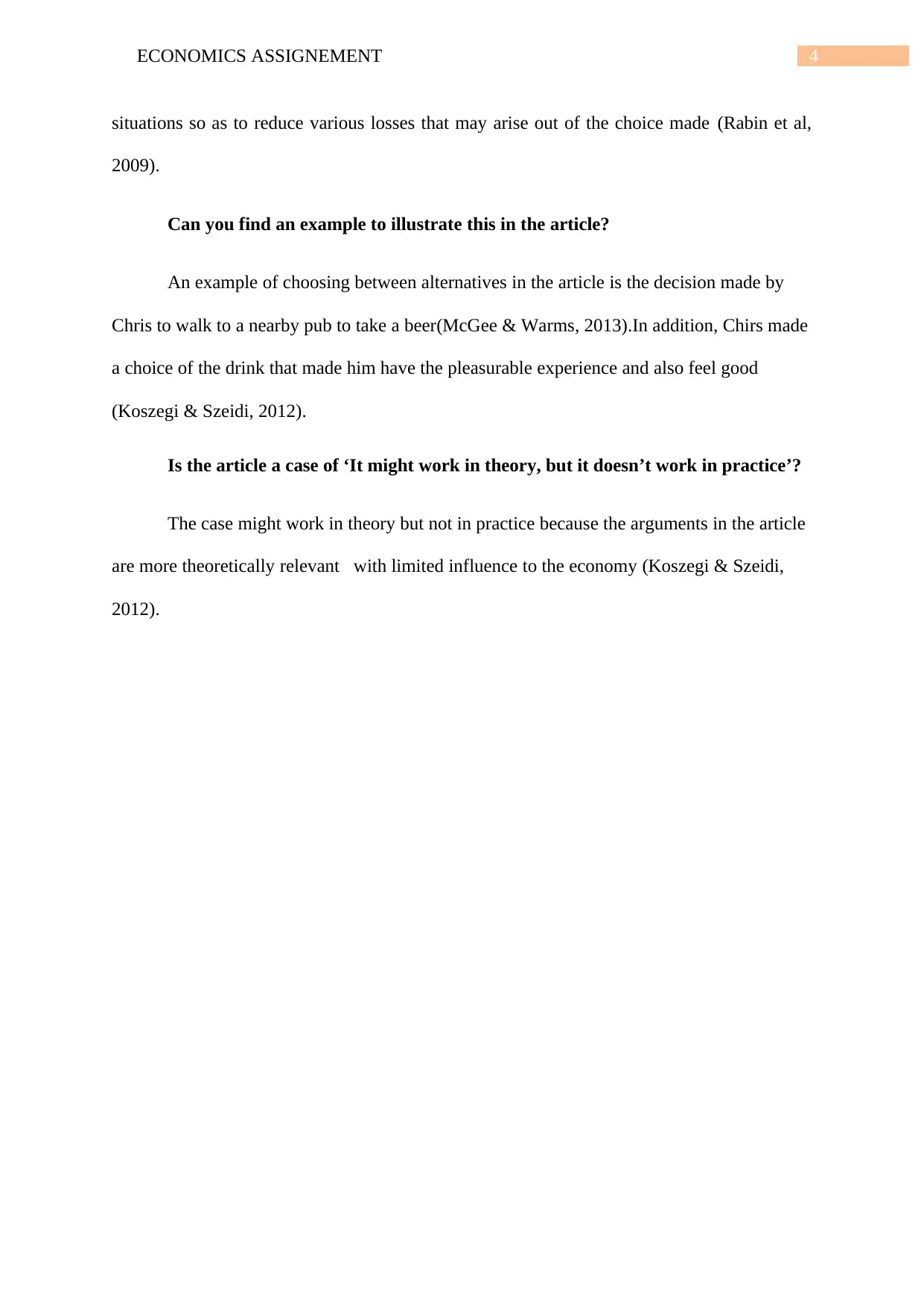
4ECONOMICS ASSIGNEMENT
situations so as to reduce various losses that may arise out of the choice made (Rabin et al,
2009).
Can you find an example to illustrate this in the article?
An example of choosing between alternatives in the article is the decision made by
Chris to walk to a nearby pub to take a beer(McGee & Warms, 2013).In addition, Chirs made
a choice of the drink that made him have the pleasurable experience and also feel good
(Koszegi & Szeidi, 2012).
Is the article a case of ‘It might work in theory, but it doesn’t work in practice’?
The case might work in theory but not in practice because the arguments in the article
are more theoretically relevant with limited influence to the economy (Koszegi & Szeidi,
2012).
situations so as to reduce various losses that may arise out of the choice made (Rabin et al,
2009).
Can you find an example to illustrate this in the article?
An example of choosing between alternatives in the article is the decision made by
Chris to walk to a nearby pub to take a beer(McGee & Warms, 2013).In addition, Chirs made
a choice of the drink that made him have the pleasurable experience and also feel good
(Koszegi & Szeidi, 2012).
Is the article a case of ‘It might work in theory, but it doesn’t work in practice’?
The case might work in theory but not in practice because the arguments in the article
are more theoretically relevant with limited influence to the economy (Koszegi & Szeidi,
2012).
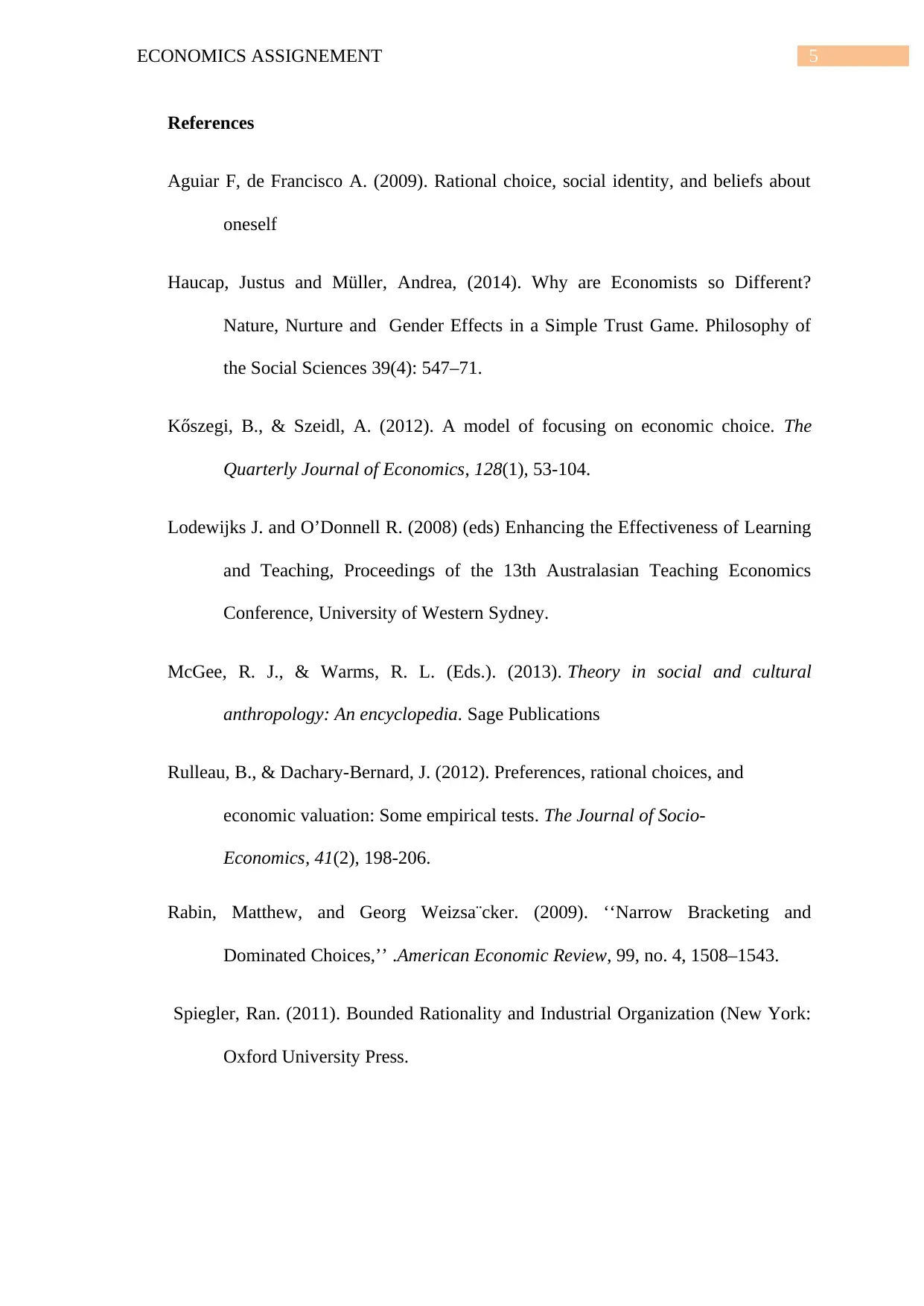
5ECONOMICS ASSIGNEMENT
References
Aguiar F, de Francisco A. (2009). Rational choice, social identity, and beliefs about
oneself
Haucap, Justus and Müller, Andrea, (2014). Why are Economists so Different?
Nature, Nurture and Gender Effects in a Simple Trust Game. Philosophy of
the Social Sciences 39(4): 547–71.
Kőszegi, B., & Szeidl, A. (2012). A model of focusing on economic choice. The
Quarterly Journal of Economics, 128(1), 53-104.
Lodewijks J. and O’Donnell R. (2008) (eds) Enhancing the Effectiveness of Learning
and Teaching, Proceedings of the 13th Australasian Teaching Economics
Conference, University of Western Sydney.
McGee, R. J., & Warms, R. L. (Eds.). (2013). Theory in social and cultural
anthropology: An encyclopedia. Sage Publications
Rulleau, B., & Dachary-Bernard, J. (2012). Preferences, rational choices, and
economic valuation: Some empirical tests. The Journal of Socio-
Economics, 41(2), 198-206.
Rabin, Matthew, and Georg Weizsa¨cker. (2009). ‘‘Narrow Bracketing and
Dominated Choices,’’ .American Economic Review, 99, no. 4, 1508–1543.
Spiegler, Ran. (2011). Bounded Rationality and Industrial Organization (New York:
Oxford University Press.
References
Aguiar F, de Francisco A. (2009). Rational choice, social identity, and beliefs about
oneself
Haucap, Justus and Müller, Andrea, (2014). Why are Economists so Different?
Nature, Nurture and Gender Effects in a Simple Trust Game. Philosophy of
the Social Sciences 39(4): 547–71.
Kőszegi, B., & Szeidl, A. (2012). A model of focusing on economic choice. The
Quarterly Journal of Economics, 128(1), 53-104.
Lodewijks J. and O’Donnell R. (2008) (eds) Enhancing the Effectiveness of Learning
and Teaching, Proceedings of the 13th Australasian Teaching Economics
Conference, University of Western Sydney.
McGee, R. J., & Warms, R. L. (Eds.). (2013). Theory in social and cultural
anthropology: An encyclopedia. Sage Publications
Rulleau, B., & Dachary-Bernard, J. (2012). Preferences, rational choices, and
economic valuation: Some empirical tests. The Journal of Socio-
Economics, 41(2), 198-206.
Rabin, Matthew, and Georg Weizsa¨cker. (2009). ‘‘Narrow Bracketing and
Dominated Choices,’’ .American Economic Review, 99, no. 4, 1508–1543.
Spiegler, Ran. (2011). Bounded Rationality and Industrial Organization (New York:
Oxford University Press.
⊘ This is a preview!⊘
Do you want full access?
Subscribe today to unlock all pages.

Trusted by 1+ million students worldwide
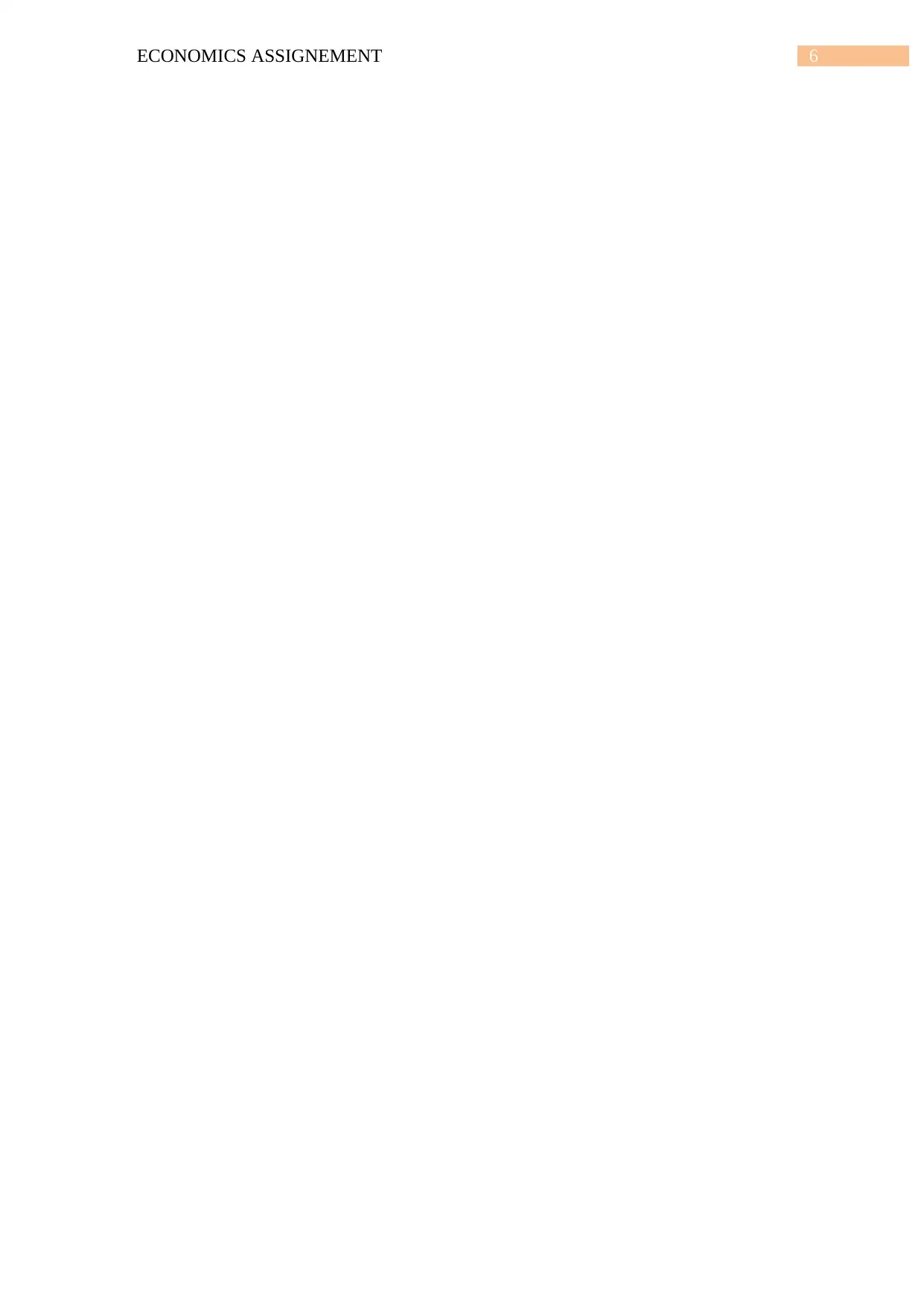
6ECONOMICS ASSIGNEMENT
1 out of 7
Your All-in-One AI-Powered Toolkit for Academic Success.
+13062052269
info@desklib.com
Available 24*7 on WhatsApp / Email
![[object Object]](/_next/static/media/star-bottom.7253800d.svg)
Unlock your academic potential
Copyright © 2020–2025 A2Z Services. All Rights Reserved. Developed and managed by ZUCOL.

